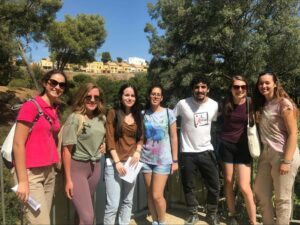
What to take on a school trip abroad?
Embarking on a school trip abroad is an exciting and enriching student experience. It gives students the unique opportunity to
You are on our High Schools -> School Trips pages!
Study-abroad trips are the best way to expose students to different cultures, traditions, and languages. These experiences help them better understand other perspectives and ways of living. Enhancing cultural awareness fosters empathy, understanding, and appreciation, promoting inclusivity, respect, and harmonious coexistence in our diverse global society.
Allowing students to explore other countries shows them a completely different look at societal norms and lifestyles since they differ so much from the ones they are used to. It also allows them to experience global issues such as environmental issues or inequity.
Promoting a global perspective broadens horizons, encourages collaboration, and nurtures a sense of interconnectedness in our interconnected world.
Abroad anything can happen; students are put into situations that they are unfamiliar with, which leads to the development of skills such as independence, adaptability, or confidence as they navigate this experience.
Encouraging personal development empowers students, unlocks potential, cultivates growth, and fosters self-confidence, leading to a fulfilling and purposeful life.
When on a school trip abroad, students get the chance to interact with locals, other students of their ages, and overall, a different culture, which strengthens interpersonal skills.
Strengthening interpersonal skills enhances communication, empathy, collaboration, and conflict resolution, fostering meaningful connections and thriving relationships in various contexts.
A study abroad trip allows students to put to the test everything they’ve learned in class; it is a fantastic way to complement and enrich classroom learning by living their lessons first-hand.
Deepening educational understanding expands knowledge, critical thinking, and problem-solving abilities, equipping students to navigate complexity and contribute to society’s progress.
A study abroad trip is not only about academics; it is also an experience students can look back with joy as an impactful event in their lives. Creating lasting memories on a study abroad trip cultivates cultural appreciation, personal growth, and lifelong friendships, enriching the educational journey.

In group high school trips, teachers and chaperons can’t always focus on every student, requiring students to take responsibility for their actions, belongings, and well-being while navigating foreign situations.
Encouraging personal responsibility and resilience empowers individuals to take ownership of their actions and adapt in the face of challenges, fostering personal growth and success.
Study abroad programs attract students from various countries, ethnicities, and socioeconomic backgrounds, so creating an environment that values and respects individuals from all backgrounds is essential, ensuring that everyone feels welcome and supported throughout their journey.
By studying abroad, students will have the chance to broaden their global perspective, challenge stereotypes, and develop a deep appreciation for different cultures. Reaching the ultimate goal, empower students to advocate for diversity and inclusion, creating positive change in their communities and beyond.
Global citizenship broadens students’ perspectives by cultivating awareness of global issues, challenges, and interconnectedness. It helps them to understand the impact of their actions on a worldwide scale.
When students see themselves as citizens of the world, they learn to respect and appreciate different cultures, traditions, and values. It encourages them to engage in intercultural dialogue, which allows them to learn how to navigate cultural differences with empathy, tolerance, and openness.

Nowadays, standing out amongst other college applicants or job candidates is vital. A study abroad experience enhances soft skills that are harder to acquire when staying in your own country, which provides students with a competitive edge in an increasingly global job market.
By exposing students to diverse cultures, fostering personal growth, and developing global citizenship, school trips abroad create lasting memories and provide students with essential skills and perspectives that support their future endeavors.
Such experiences cultivate an appreciation for diversity, promote intercultural understanding, and enhance career and college readiness, preparing students to thrive in today’s interconnected world.

Embarking on a school trip abroad is an exciting and enriching student experience. It gives students the unique opportunity to

Are you planning a school trip abroad and wondering how to raise funds? This article will explore strategies to fundraise

School trips abroad are a life-changing experience for students where they learn beyond the classroom while exploring a foreign culture.

School trips abroad give students a transformative educational experience and numerous benefits. Through these experiences, students are granted valuable opportunities
Planning a school trip?
Where should we send you the brochure?
Receive travel and education information directly in your inbox
Where should we send you it?
Receive your brochure
Where should we send you the brochure?